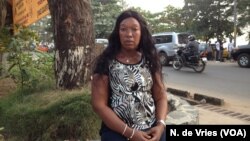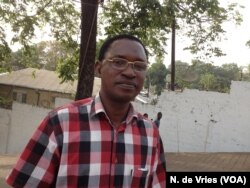Mariama Ndow is one of hundreds of migrants who returned home to Sierra Leone this year. She is relishing her freedom after having spent 10 months in Kuwait.
At first she thought she was going to work as a security guard. But when she got to Kuwait, she was sold as a housekeeper through an agency to several families.
“I was not happy in Kuwait... always, I was crying, everyday, when I remember home and my two kids, I cry everyday,” she said.
She says she only got paid once the entire time she was there. And was forced to work almost 24 hours a day. When she got sick there was no sympathy.
"I don’t have choice, they [employer] will say 'go and work, you are here to work, you don't have to sit down and rest, we buy you for this job, you have to work,'" she said.
She managed to escape while the family was out one day. Through the help of a stranger on the streets of Kuwait, she was directed to the International Organization for Migration.
After several months in a shelter, she was brought back to Sierra Leone with the IOM’s assistance. It helped her reintegrate into society by providing financial compensation to set up a business. She now sells clothes and says it is enough to keep her going.
According to a recent U.N. report, there are now an estimated 258 million people living in a country other than their country of birth. Abuse of migrants is happening in many places. Most recently, in Libya, there were allegations of migrants being sold in slave markets.
Earlier this month, 60 migrants returned from Libya to Sierra Leone with help from the IOM.
Umaru Barrie is one of the migrants who just returned from Libya. He left Sierra Leone because he was jobless and homeless.
“When my little money was finished, I didn’t have a place to stay, so sometimes I slept on the beach, sometimes I slept in the ghetto with the boys,” he said.
Most migrants use Libya as a gateway to Europe. The United Nations estimates about 700,000 migrants are in Libya. Barrie says he wanted to stay in Libya but he soon realized life was not any better. He also describes not always getting paid for work. And his wife, who he met in Libya, often had payments withheld.
They eventually managed to get in touch with the IOM in Libya and started the process to be repatriated to Sierra Leone. Barrie, his wife and their son arrived in the early morning hours of December 14 on a chartered flight. It was bittersweet.
“I don’t have money, but I’m OK with my life, my family,” said Barrie.
The IOM will also compensate Barrie and he is hoping to start up a business. For now, he is staying with his brother. And although it is tough starting over, yet again, he is grateful to be out if Libya and back in his country.












